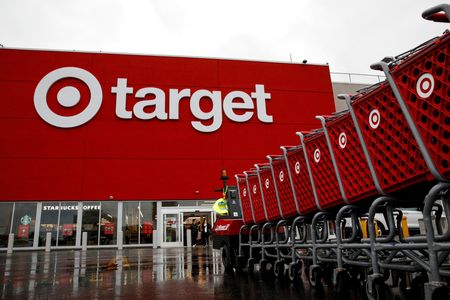By Aishwarya Venugopal and Ananya Mariam Rajesh
(Reuters) -Target Corp on Wednesday forecast a grim second quarter as consumers shun non-essentials such as electronics and home goods in the face of persistently high prices, but the retailer maintained its full-year profit expectations.
U.S. retail sales have remained resilient despite higher prices but consumers have been careful about their spending, hurting companies such as Target and Home Depot, whose merchandise largely consists of discretionary products.
Shares of Target, which beat first-quarter estimates, closed up 2.58% on Wednesday.
“American consumers continue to face difficult trade-off decisions as they juggle the wants and needs of their families,” Chief Growth Officer Christina Hennington said on a post-earnings call. “The fear of a looming recession weighs heavily on many American families.”
The company’s lackluster forecast followed bleak numbers from U.S. home improvement chain Home Depot, which warned of a steeper-than-expected drop in annual profit. Bigger rival Walmart, which gets more than half of its revenue from groceries, is set to report earnings on Thursday.
“These continued signs of caution among consumers have reinforced why we entered this year with a conservative inventory position,” CEO Brian Cornell said.
Target’s inventory at the end of the first quarter was 16% lower than last year, reflecting more than a 25% reduction in discretionary items, helping gross margins improve.
The company’s executives used the word “cautious” at least 13 times during the hour-long earnings call.
“Target’s original guidance for the year was on the conservative side … Against that backdrop, we think Target’s print is a step in the right direction,” D.A. Davidson analyst Michael Baker said.
SHOPLIFTING TO WEIGH
Target also warned theft and organized retail crime could reduce this year’s profitability by more than $500 million, compared to 2022 when the inventory “shrink”, or loss, was over the expected $650 million.
CEO Cornell called organized crime – carefully planned operations in which criminal groups steal large amounts of merchandise to resell for a profit – an “increasingly urgent” issue.
David Klink, senior equity analyst at Huntington Private Bank, however, said he found Target’s comments on retail crime “suspicious.”
“That’s a huge drag to be coming from organized crime when we hadn’t even heard of it before,” said Klink, whose firm holds $24 million in Target shares.
“Not that the claim is necessarily untrue, but it seems a bit of an amorphous excuse for some weakness on gross margins.”
Target declined to comment further on the hit from organized crime.
Huntington was hoping for stronger results as Target’s first quarter is a seasonally strong period for margins, which are usually in the high-20s range, Klink said.
Target’s first-quarter gross margin rate came in at 26.3%, up from 25.7% a year earlier, driven by lower freight and costs, fewer markdowns and higher retail prices, but partly offset by higher inventory shrink.
Target projected adjusted profit between $1.30 and $1.70 per share, below estimates of $1.93 for the current quarter and forecast comparable sales to decline in the low-single digits.
“There (are) still some pain points with the consumer and they are still being cautious, which in Target’s case I do think it’s extremely justified going forward,” Jessica Ramirez, senior analyst at Jane Hali and Associates.
First-quarter comparable sales grew by a better-than-expected 0.7%, helped by a 0.9% increase in-store traffic, but digital sales posted a surprise drop.
(Reporting by Ananya Mariam Rajesh and Aishwarya Venugopal in Bengaluru; Additional reporting by Siddharth Cavale in New York; Editing by Sriraj Kalluvila, Deepa Babington and Jamie Freed)

